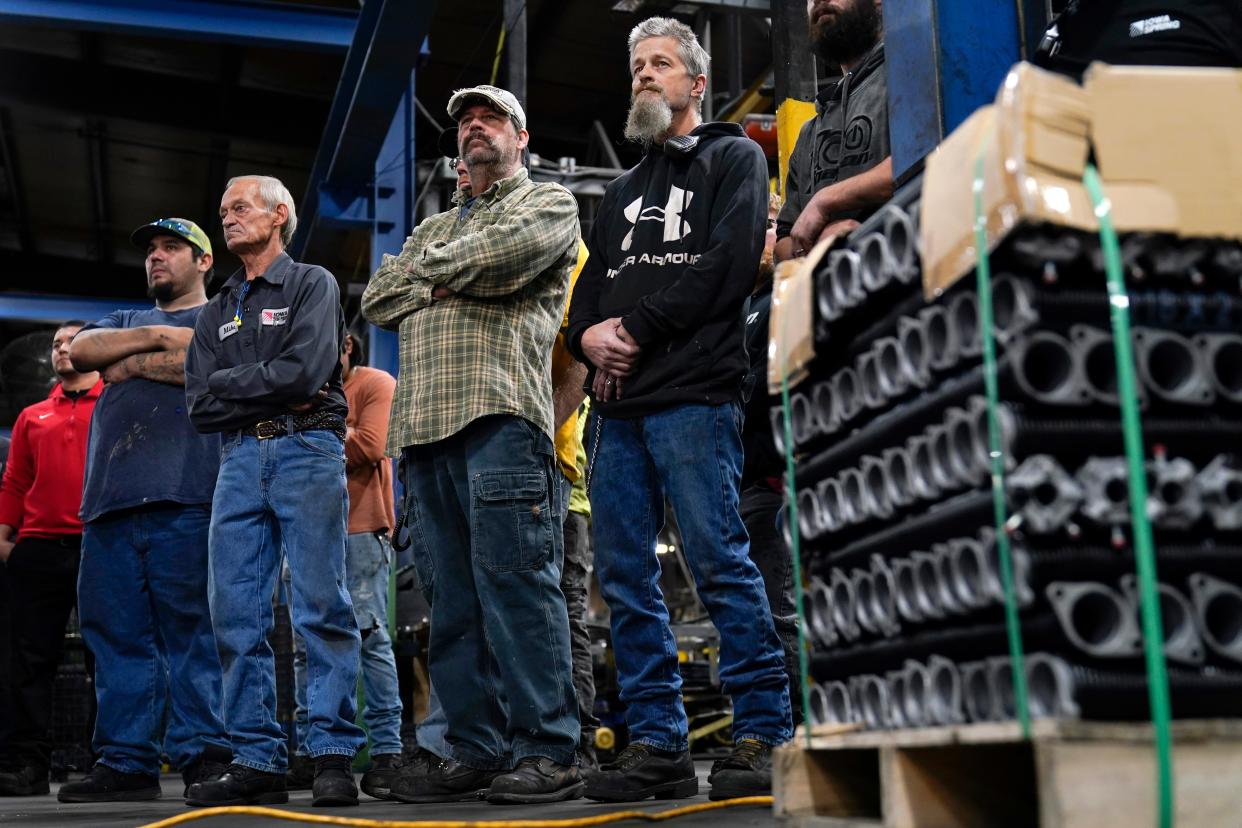Iowa's workforce needs training, opportunities. How new legislation could help.

- Oops!Something went wrong.Please try again later.
When Ashley Hinson travels her northeast Iowa congressional district, she hears one recurring theme from constituents.
“What I continue to hear from folks is workforce, workforce, workforce is the number one issue, especially this year,” said the Republican U.S. representative from Marion.
With backing from businesses, Hinson has introduced a bill that would enable people as young as 18 to obtain commercial driving licenses for interstate travel, a requirement for driving large trucks across state lines. Currently, the minimum age is 21.
More: Iowa's unemployment rate ticks upward in November despite job gains
She's also introduced a bill that would provide a tax credit for employers who maintain training programs for employees not seeking a four-year college degree. A third piece of Hinson legislation would require the U.S. secretaries of labor and energy to annually submit to Congress a joint economic analysis of occupations and career paths impacted by changes in the energy and critical manufacturing industries. She says it's aimed at helping workers better plan career paths.
Earlier this year, Hinson also introduced a bill, now before the House Committee on Education and Workforce, that calls for funding grants for child care facilities providing services for parents working nontraditional hours.
U.S. Rep. Ashley Hinson says she'll seek bipartisan support for workforce bills

Hinson said her proposals are a byproduct of her work on the House Select Committee on China, where there has been discussion of how to make the United State more competitive in the global economy.
“We've been taking a look at some outdated policies and again trying to focus on what we can do here to kind of empower our business community to help elevate workers also," she said. "I think that's kind of what our package is designed to do. It's continuing to provide pathways to success, not necessarily by pushing the four-year degree programs, but looking at the trades and again empowering workers to excel in their chosen fields whatever that may be.”
More: Why Iowa's 4 GOP Congress members say they voted for the Biden impeachment investigation
Hinson said the work will really begin now that the holidays are over and she tries to build support for the legislation “from both sides of the aisle”
Both the Greater Des Moines Partnership and the Iowa Business Council cited the need to address issues related to workforce in their recently released legislative priorities for 2024, including some of the topics addressed in Hinson’s proposed legislation.
Iowa business groups highlight workforce issues in 2024 legislative goals
In its legislative priorities released shortly before Christmas, the Business Council, comprised of executives from 22 of Iowa’s largest employers, noted, “The availability of a talented pipeline is critical for long-term economic prosperity in Iowa. The IBC will continue to advocate for initiatives that grow Iowa’s workforce including work-based learning programs, childcare, and housing for all.”
Tax credits like the ones proposed by Hinson could be an incentive for employers to “train up” employees, helping them increase their skills and value, said David Leto, president and CEO of the Palmer Group employment agency, headquartered in Des Moines.
Leto said he can see companies with skilled trades as well as some information technology jobs being able to utilize on-the-job, hands-on training for positions that might not require a four-year college education.
More: Robots to the rescue: Without enough workers, more Iowa manufacturers turn to automation
“Value training for companies is very expensive so tax credits would help,” he said.
Hinson said that when she recently visited Timberline Manufacturing in Marion, officials of the electrical equipment company told her they spend $1 million a year on employee training programs.
For employers like Tim Bianco, CEO of Iowa Spring Manufacturing, based in Adel, finding the workers needed to staff the 24/7 operation is a constant challenge.
“In the last 10 years, and I’m not kidding, we are continually 10% to 15% short-staffed all the time,” Bianco said.
With aging workforce, training new workers vital
In previous interviews, Iowa State University economist Peter Orazem has said Iowa’s aging population contributed to the tightening of the state's labor force in recent years.
When large portions of the economy were shut down early in the COVID-19 pandemic, Iowans close to retirement age left the labor market in greater proportions than in other parts of the nation, resulting in a comparatively steep drop in Iowa’s labor participation rate, Orazem said.
More: Former Des Moines University building to become simulation center for health care students
Bianco said his company has consistent training programs for employees and would likely be able to use Hinson’s proposed tax credits if the bill passes. With 300 employees in five facilities across four states, he said, training is always going to be priority, even without tax credits.
“But there’s other, smaller businesses that it could be critical for their growth,” he said.
Safety a top issue in lowering truck-driving age
Hinson said the proposal to lower the CDL age for interstate travel has previously had bipartisan support in Congress, though it has yet to become law.
The average age of CDL drivers is 58 nationally and 56 to 58 in Iowa, making the recruitment of new drivers even more crucial, said Brenda Neville, president and CEO of the Iowa Motor Truck Association.
More: Iowa's congressional delegation slams Biden for closing key Texas-Mexico rail crossings
Current Iowa law allows CDL-holding drivers under age 21 to operate within the state. But an 18-year-old who can legally drive a semi the 330 miles from Council Bluffs to Dubuque is prohibited from crossing the Mississippi River bridge to East Dubuque, Illinois, said Neville.
While her organization supports Hinson’s bill, calling it “a great first step,” Neville said any congressional debate on the topic will center on safety, and she expects a final bill might be “graduated” rather than allowing younger drivers to freely travel anywhere.
“We might see something like allowing younger drivers to operate in their state and surrounding states until they are 21,” Neville said.
She said safety also will be a key issue for the membership of her organization.
“We need drivers, but you are still talking about an 18-year-old in a 96,000-pound truck. Proper training and safety still has to be the top priority,” she said.
Employers want help holding onto workers, especially in rural Iowa
If there has been an upside to a workforce shortage, Hinson said, it has been in the form of higher wages and better benefits in the competitive market.
Bianco said retention of existing employees has become just as important as recruitment of new workers, particularly in rural areas like Adel.
“The recruitment process takes a long time. It's expensive and it’s time consuming to train someone. Once we get them, we want to hang on,” he said.
As an employer, he said, he also has been talking to elected officials about housing and child care needs, especially in rural areas.
“From my perspective, I look at things holistically, but again, I can have all the customers in the world wanting my products, but if I don't have the people to run it because they don't have anywhere to live or someone to watch their children, that’s an issue,” Bianco said.
This article originally appeared on Des Moines Register: US Rep. Ashley Hinson of Iowa introduces bills on workforce needs

